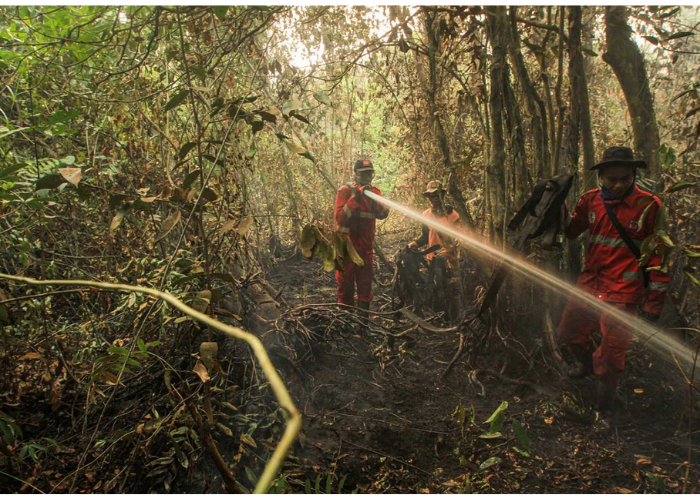Positive trends continue to emerge amidst fires in IndonesiaBY ALANA HILL
- 23 April 2024
- Posted by: Competere
- Categories: highlights, News

WHY WAS THE FIRE SEASON ROBUST IN 2023?
Fire season was particularly strong this past year in Indonesia, with burning commencing as farmers cleared land for crops and grazing animals. Beginning in June 2023 through December 2023, the dry season was exacerbated by the El Niño weather patterns, making Indonesia more dry and warm than usual. As El Niño approaches, the Pacific jet stream moves south of its natural position due to warmer water surface temperatures. The usual east-to-west trade winds weaken, even reverse, causing a shift in atmospheric circulation patterns, which causes drought in areas known for wetter and cooler weather patterns. The Indian Ocean Dipole is another factor contributing to the climate pattern, with warm waters pushed to the western side of the Indian Ocean and cold water brought to the surface in the east.
POSITIVE TRENDS COMPARED TO PREVIOUS YEARS
What were the consequences of the weather patterns? 13,260 hectares of primary forest were lost with a total of 1.16 million hectares of land and forest burned. Although large numbers of hectares were lost, the figures are much lower than the loss from 2019, which also experienced El Niño weather patterns. The size of the loss in 2023 is equivalent to the size of Qatar while the size of the loss in 2019 is approximately the size of Kuwait. August through October had the largest burning incidents with about 70% of the fires occurring in these months. Even though the 2023 total has decreased from 2019, they are still 5 times higher than the 2022 total of 204,900 hectares of land and forest burned. A trend formed with intense fire seasons happening every five years with the potential of becoming shorter and unpredictable due to climate change.
LAW & LAND
How has Indonesia been so successful in handling forest fires? The government and the private sector motivate positive fire trends with commitments to mitigate fires. The Ministry of Environment and Forestry upheld stronger law enforcement by filing civil lawsuits against companies that failed to handle fires on their land which called for fines. One company in particular used to dry out their soil rendering it highly flammable and when their land caught fire, the ministry was able to sue, won the case, and received $25.5 million of paid fines. Policies that focus on handling degraded and unmanaged land are also effective in mitigating fires. Since fires are focused in these areas instead of the forests, less carbon is released into the atmosphere, and emissions from fires decrease.
Image Credits: courtesy of The Jakarta Post >>>
.Im

